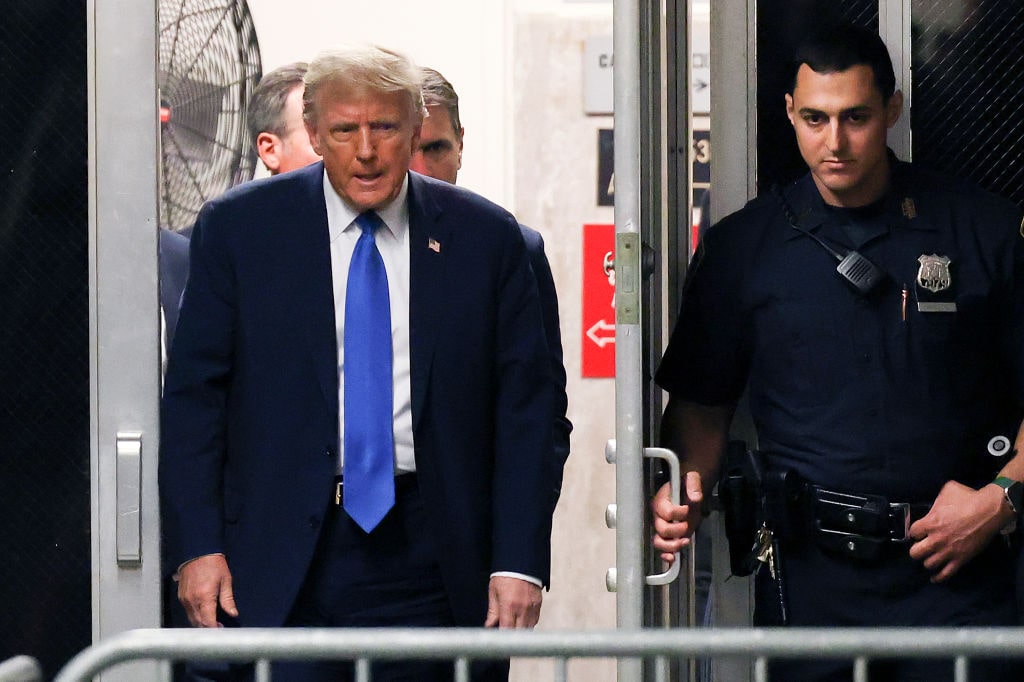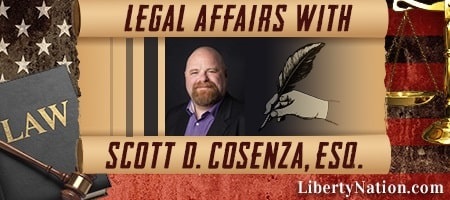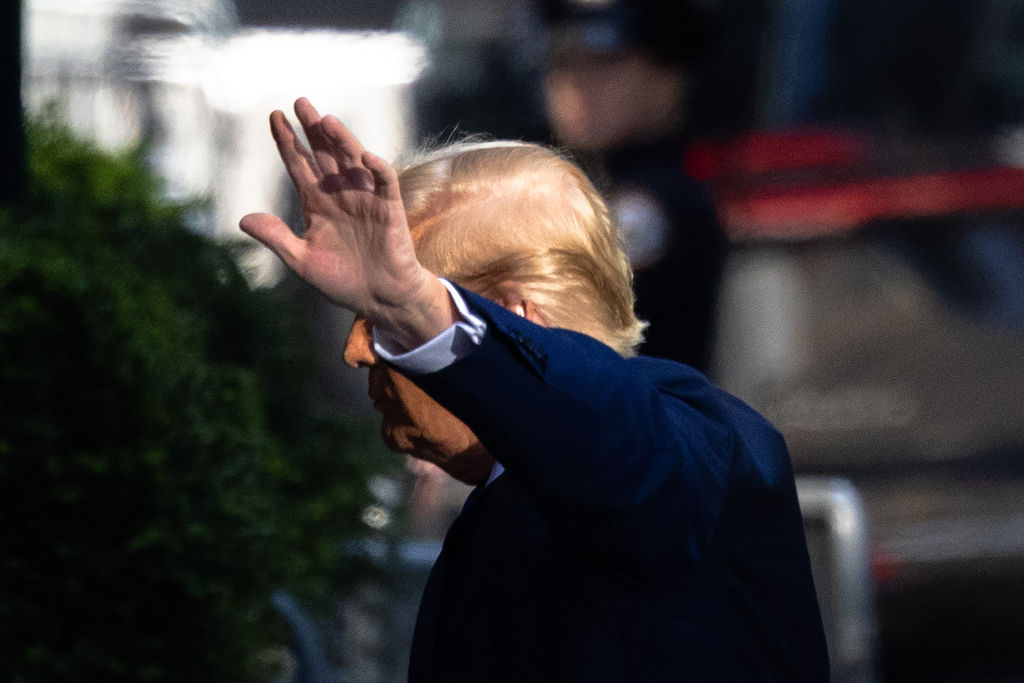Former President Donald Trump was in court yesterday, April 22, as attorneys made their opening arguments in what is commonly called a “hush money” case. Defendant Trump faces 34 felony charges that run the gamut from falsifying business records and touching on accusations of election law and tax law violations.
 Being the first-ever case of a former president criminally tried, naturally, all eyes are on the Manhattan courtroom. But how can the public gauge what points are scored and what procedures are at play? We asked Liberty Nation’s Legal Affairs Editor Scott D. Cosenza to sift through the critical elements of, potentially, the most significant trial of the year so far.
Being the first-ever case of a former president criminally tried, naturally, all eyes are on the Manhattan courtroom. But how can the public gauge what points are scored and what procedures are at play? We asked Liberty Nation’s Legal Affairs Editor Scott D. Cosenza to sift through the critical elements of, potentially, the most significant trial of the year so far.
Trial Arguments Ensue
Mark Angelides: Yesterday was all about the opening arguments. Who makes them, and are they allowed to include suppositions? Or are both sides supposed to merely introduce evidence and present the particulars of their respective cases?
Scott D. Cosenza: Each side sets the table by stating what they will prove through the introduction of evidence. Pure supposition is not allowed. Evidence is described rather than introduced. For instance, the prosecutor wouldn’t show them a contract between Stormy Daniels and Mr. Trump but state that such a contract existed and describe its purpose.

(Photo by Yuki Iwamura-Pool/Getty Images)
MA: The first day of this trial saw prosecutors dredge up pretty much every negative story about Donald Trump they could find, beginning with the accusation that he “corrupted” the 2016 election, a brief nod to the infamous Access Hollywood tape, and pretty much every pitstop along the way. Is the prosecutor trying to tie these all together with the actual accusations, or is it just a great way to smear Trump in front of the jury?
SDC: In Alec Baldwin’s finest dramatic turn in the 1992 movie Glengarry Glen Ross, he famously admonishes a group of salesmen about the ABCs of sales, “Always Be Closing!” The prosecution and the defense are constantly trying to sell the jury – from the initial “Good Mornings” to the final “Thank yous” of their presentations.
MA: And what argument did Trump’s defense team make?
SDC: That the whole affair is an old story of little import – and that the case against Trump originated with Micheal Cohen, a convicted perjurer driven not by a desire to reveal the truth but by a craving to see Trump convicted. Also, confidentiality clauses are perfectly legal and common enough, and Stormy Danielss’ behavior before the story blew up was akin to extortion. Mr. Trump’s lead attorney, Todd Blanche, told the jury that Daniels had made hundreds of thousands of dollars off the story and that she owed Trump $600,000.
Contempt?
MA: Today’s proceedings (April 23) will be delayed until a “contempt proceeding” occurs. Presumably, this is the prosecution saying that Trump violated his gag order. What are the possible outcomes here? And what does the gag order cover?
SDC: He’s up against a potential $1,000 fine per violation. It was initially charged as three, but now they’re up to ten, I believe. Ideally, don’t want your client to be held in contempt – but this is, relatively speaking, a sideshow.
 MA: I’m curious about why the rules for entering evidence change based on whether Trump testifies. I’ve heard the term “a shield, not a sword” used. From a layman’s perspective, this seems like a threat, designed to deter Trump from taking the stand. Still, I also suspect this is relatively standard practice, as the prosecution can only follow specific evidentiary paths if the defense brings them up. What’s the reality?
MA: I’m curious about why the rules for entering evidence change based on whether Trump testifies. I’ve heard the term “a shield, not a sword” used. From a layman’s perspective, this seems like a threat, designed to deter Trump from taking the stand. Still, I also suspect this is relatively standard practice, as the prosecution can only follow specific evidentiary paths if the defense brings them up. What’s the reality?
SDC: Judge Merchan used those words during a Sandoval hearing, a feature of New York criminal procedure, required when a defendant who has some history of misconduct or criminal acts plans to testify. It’s valuable to the defense, who learns, without committing to anything, which evidence the prosecution intends to bring to impeach a witness. In this context, to impeach means to undermine a person’s credibility.
Friends In High Places
MA: The first witness called yesterday was David Pecker, the former publisher of the National Enquirer. He was a witness for the prosecution. What is his role here? What does the prosecution hope to achieve with his testimony?
SDC: His short-lived testimony will be picked back up on Tuesday. We expect Mr. Pecker to testify that he was in league with Donald Trump in what’s being called a “catch and kill” scheme to silence those trying to sell negative stories about the then-presidential candidate. Prosecutors would argue the practice violated election law, as disallowed campaign contributions.

(Photo by Michael M. Santiago/Getty Images)
MA: Soon enough, former Trump lawyer Michael Cohen will take the stand. As a convicted felon, do you think his testimony will hold weight with the jury?
SDC: If Mr. Cohen was merely a felon, perhaps. Cohen, however, was convicted of lying under oath. His felonies fall into a special class, known as crimen falsi crimes. There are many restrictions on whether prior convictions may be used to impeach witnesses. However, in the federal rules of evidence, for example, previous convictions on crimen falsi crimes must always be admitted. Because you were convicted of stealing a Buick in 1985, for example, it may have no bearing on whether you stole a Rolex in 2023 and probably would not be admitted into evidence at trial. If you lied on the stand during a hearing in 1985 and were convicted of perjury, that is relevant to your veracity in a 2024 case – and forevermore – and would come in.
MA: You wrote a superb prelude article to this trial in which you discussed the lead prosecutor’s relationship with President Obama and President Biden. Frankly, I was shocked by what you described. Could you give our readers a recap and explain why this is so unusual?
SDC: Simply looking at the work history, DA Bragg’s choice of lead prosecutor suggests the case against Trump is motivated by party politics and not a mere application of the facts to the law. Matthew Colangelo served as a deputy assistant to President Obama and deputy director of the National Economic Council. Before that, he was chief of staff for Department of Labor Secretary Tom Perez for three years and as deputy assistant attorney general for civil rights at the Department of Justice.
When Trump won the presidency, Mr. Colangelo went to work for New York Attorney General Letitia James to prosecute Mr. Trump out of her office. The New York Times reported that he led that effort. Then, Colangelo joined the Biden administration, on day one, as acting associate attorney general – the #3 position in that cabinet-level agency.
He left the Department of Justice to join Alvin Bragg’s office when the Manhattan district attorney decided to prosecute Trump. At the time of his hiring, the Times noted, “While Mr. Colangelo has broad knowledge of the Trump Organization’s business practices and extensive litigation experience, he comes to the investigation having spent little time working on white-collar criminal prosecutions. He has never been a line prosecutor or worked as a criminal defense lawyer.” In the context of a Trump prosecution, Colangelo’s resume doesn’t quite paint a picture of the dispassionate truth-seeker.



